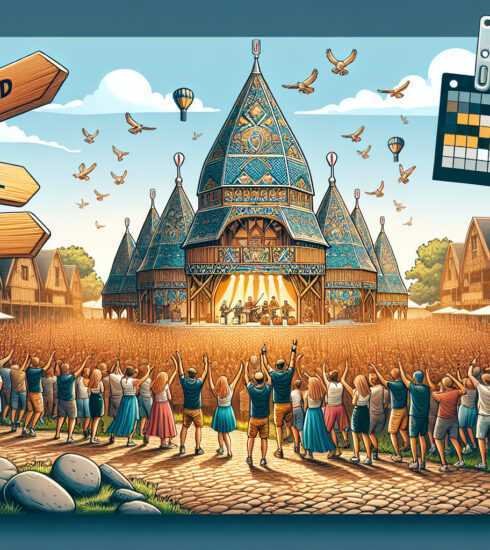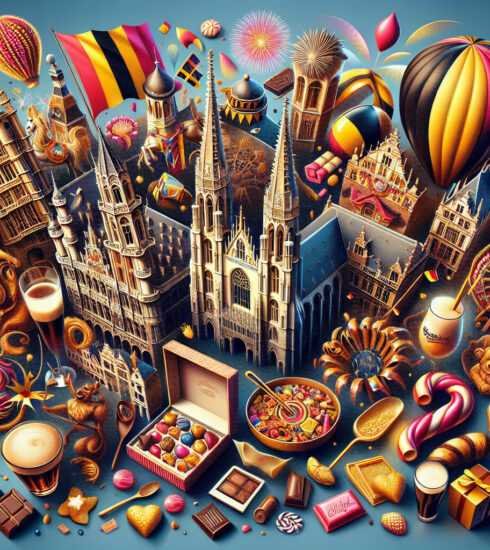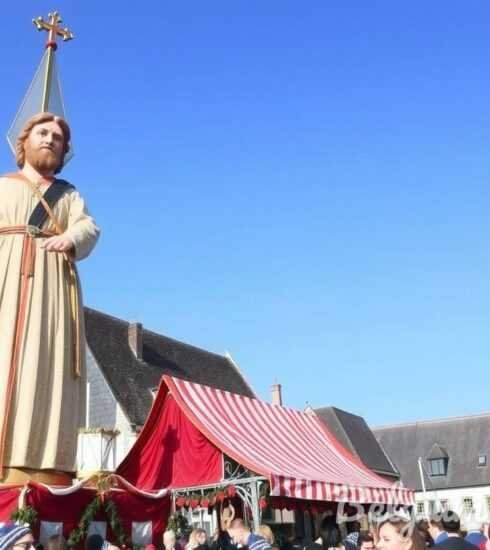Experience Belgium Historical Festivals: A Journey Through Time
Journey Through Time: Belgium’s Historical Festivals
Belgium, a small yet vibrant European country, boasts a rich history intertwined with diverse cultural traditions. Among the numerous ways Belgians celebrate their heritage, historical festivals hold a special place. Journey Through Time: Belgium’s Historical Festivals is an enchanting look into how Belgium’s past is kept alive through spirited festivities, pageantry, and reenactments that both locals and tourists eagerly anticipate each year.
Understanding the Significance of Historical Festivals in Belgium
In Belgium, historical festivals are not mere entertainments; they are a profound homage to the past. These events connect the present with history, allowing participants to experience life as it was centuries ago. Understanding the significance of these festivals provides insight into the Belgian spirit of community, resilience, and pride.
Historical festivals in Belgium serve several important purposes:
- Preservation of History: Through meticulous historical reenactments, these festivals preserve crucial aspects of Belgian heritage.
- Cultural Identity: They strengthen local and national identity, fostering a sense of pride among Belgians.
- Tourism: These festivals attract visitors from around the world, contributing significantly to Belgium’s tourism sector.
Top Historical Festivals in Belgium
Belgium is home to numerous historical festivals, each with unique characteristics reflecting the country’s diverse heritage. Let’s delve into the most notable ones that capture the essence of Belgium’s history.
1. Ommegang of Brussels
The Ommegang of Brussels, held in July, is one of the most famous and spectacular historical festivals in Belgium. Rooted in the 16th century, this event originally celebrated the holy relic of a miraculous statue of the Virgin Mary. Over time, it evolved into a grand pageant commemorating the entry of Emperor Charles V into Brussels in 1549.
Today, the Ommegang is a dazzling historical reenactment featuring over 1,400 participants in period costumes, marching bands, jousting knights, and elaborate floats. The spectacular procession navigates through the historic Grand Place, offering a visual feast for spectators.
For more details on the Ommegang, visit the official Ommegang website.
2. The Ghent Festivities

The Ghent Festivities, or “Gentse Feesten,” is a ten-day cultural extravaganza held every July in the historic city of Ghent. Dating back to 1843, this festival has grown into one of the largest cultural celebrations in Europe, attracting over a million visitors annually.
While contemporary in many ways, the Gentse Feesten pays homage to Ghent’s rich medieval heritage through various historical reenactments, street performances, and traditional music. Key highlights include:
- Historical Plays: Performances that delve into significant events from Ghent’s history.
- Medieval Markets: These markets recreate the atmosphere of medieval Ghent with artisans and merchants.
- Parades and Processions: Colorful parades featuring historical characters and traditional costumes.
To learn more about the Gentse Feesten, check out the official website.
3. Binche Carnival
The Binche Carnival, held in the town of Binche during the Carnival season (three days before Ash Wednesday), is one of Belgium’s most unique and UNESCO-recognized festivals. With its roots in the 14th century, the Binche Carnival is renowned for its Gilles, elaborately costumed men who wear wooden shoes, wax masks, and feathered hats.
The carnival reaches its peak on Shrove Tuesday with a vibrant parade, where the Gilles march through the streets, throwing oranges into the crowd as symbols of good luck. The Binche Carnival is a living example of Belgium’s intangible cultural heritage.
For more about the Binche Carnival, visit the official website.
4. The Procession of the Holy Blood
The Procession of the Holy Blood in Bruges is a religious and historical festival held every Ascension Day. This solemn procession commemorates the relic of the Holy Blood, said to have been brought to Bruges from the Holy Land in the 12th century.
Participants clad in medieval attire, representing biblical scenes and historical events, parade through the streets of Bruges, carrying the relic. The procession attracts thousands of pilgrims and tourists, making it a significant event in the religious calendar and a captivating historical spectacle.
For detailed information on the Procession of the Holy Blood, visit the official website.
5. The Battle of the Golden Spurs Reenactment
The Battle of the Golden Spurs Reenactment in Kortrijk commemorates the 1302 battle between the Kingdom of France and the County of Flanders. Held every July, this reenactment celebrates the Flemish victory and has become a symbol of Flemish pride and identity.

The reenactment features:
- Armed Combat Demonstrations: Depictions of medieval battles using authentic weaponry and tactics.
- Historical Camps: Reconstructions of medieval camps, providing insights into the life of soldiers.
- Pomp and Pageantry: Displays of medieval chivalry, heraldry, and knightly culture.
For more about the Battle of the Golden Spurs Reenactment, visit the City of Kortrijk website.
The Role of Local Communities in Sustaining Historical Festivals
Local communities play a crucial role in sustaining Belgium’s historical festivals. The residents’ dedication to preserving their heritage is evident in their active participation and organization of these events. From crafting authentic costumes to performing in reenactments, the involvement of locals ensures the accuracy and vibrancy of these festivals.
Belgian community groups, cultural associations, and historical societies often collaborate to ensure the sustainability of these festivals. This collective effort fosters a sense of unity and pride among the residents, making these festivals not just historical reenactments but also a celebration of contemporary community spirit.
The Impact of Historical Festivals on Tourism and Economy
Belgium’s historical festivals significantly impact tourism and the economy. These events attract millions of visitors annually, contributing to the national and local economies through tourism-related activities such as accommodation, dining, and transportation.
A study by the Belgian Tourism Office revealed that historical festivals account for a noteworthy percentage of the country’s tourism revenue. In addition, local businesses benefit from increased foot traffic, while artisans and craftsmen gain a platform to showcase and sell their wares. Thus, the economic ripple effect of these festivals extends far beyond the events themselves.
The Global Appeal of Belgium’s Historical Festivals
Belgium’s historical festivals have a global appeal, drawing visitors from every corner of the world. The intricate blend of history, culture, and entertainment appeals to history buffs, cultural enthusiasts, and casual tourists alike.
International visitors often plan their trips around these festivals, eager to experience the vibrant festivities and immerse themselves in Belgian history and culture. This global interest helps promote Belgium as a top destination for cultural and historical tourism.
Challenges in Organizing Historical Festivals
While these festivals are celebrated nationwide, organizing them often presents several challenges. Key issues include:

- Funding: Securing sufficient funds to cover the costs of costumes, props, logistics, and other expenses.
- Regulatory Approvals: Obtaining necessary permits and adhering to regulations regarding public events.
- Authenticity: Ensuring the historical accuracy of reenactments, which requires extensive research and attention to detail.
Despite these challenges, the resilience and dedication of local communities and organizers ensure the continued success of Belgium’s historical festivals.
How to Experience Belgium’s Historical Festivals
For those keen on experiencing Belgium’s historical festivals, consider the following tips:
- Plan Ahead: Research festival dates and schedule your visit accordingly.
- Book Early: Accommodation and transport options can get booked quickly, so make reservations well in advance.
- Engage with Locals: Interacting with local participants can provide deeper insights into the festivals and enhance your experience.
For a detailed guide on festival planning, visit this article.
The Future of Belgium’s Historical Festivals
As Belgium looks to the future, the outlook for its historical festivals remains bright. Advances in technology and increased awareness of heritage preservation contribute to the enhancement and sustainability of these events. Virtual reality (VR) and augmented reality (AR) technologies may play a role in making historical festivals more immersive, offering new ways for people to experience Belgium’s rich history.
Moreover, ongoing efforts to include younger generations in these traditions ensure that the knowledge and enthusiasm for these festivals are passed on, safeguarding them for future tenacity
To explore more about how the festivals and events influence the local culture, read this article.
Conclusion
In conclusion, Journey Through Time: Belgium’s Historical Festivals sheds light on how Belgium’s past continues to thrive through vibrant celebrations. These festivals not only honor historical events and traditions but also foster community spirit and contribute significantly to tourism and the economy. Whether you are a history enthusiast or simply looking for a unique cultural experience, Belgium’s historical festivals offer a captivating journey through time that is sure to leave a lasting impression.
For additional resources and information on festivals and events in Belgium, visit the Belgium Trip Festivals and Events section.






